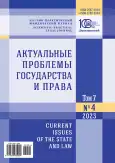Cyberspace as a crime scene: current trends, features, prevention measures
- Authors: TRUFANOVA A.Y.1, SINYAEVA M.I.2
-
Affiliations:
- LLC AF “Reut”
- Southwestern State University
- Issue: Vol 7, No 4 (2023)
- Pages: 610-619
- Section: Материальное право
- URL: https://journal-vniispk.ru/2587-9340/article/view/303753
- ID: 303753
Cite item
Abstract
The relevance of this topic is due to the fact that the development of technology, the prevalence of computer technology and the Internet among the population have led to the emergence of a global problem for society – cybercrime. The purpose of this study is to analyze crimes committed in the information and digital space in the Russian Federation and determine preventive measures for various areas of this type of crime. Today, we are not yet talking about the timely universal prevention of cybercrime by law enforcement agencies; we consider it necessary to develop legislative regulation of this area of activity and to ensure the necessary retraining of law enforcement agencies to increase knowledge in the field of prevention, prevention and detection of cybercrimes. The methodology consists of dialectical, structural, formal legal and comparative legal methods, analysis and synthesis. The history and causes of crimes in the cyberspace are analyzed, the features of cyber attacks and cybercrimes in various fields are studied, and preventive measures for the corresponding crime are proposed. It is noted that the legal mechanisms of responsibility for some types of crimes are absent in the legislation due to the constantly changing methods of committing crimes, which also make it difficult for law enforcement agencies to solve them. Their solution is seen in the comprehensive application of preventive measures, timely changes in legislation and regular retraining of law enforcement agencies.
About the authors
Alexandra Yu. TRUFANOVA
LLC AF “Reut”
Author for correspondence.
Email: trufanovaalexandra@gmail.com
ORCID iD: 0000-0002-9556-5789
Lawyer
Russian Federation, Verkhny Reutets Vlg. 307048, Medvensky District, Kursk Region, Russian FederationMaria I. SINYAEVA
Southwestern State University
Email: mari_sinyaeva@mail.ru
ORCID iD: 0000-0003-3477-5448
Senior Lecturer of Criminal Law Department
Russian Federation, 94 50 Let Oktyabrya St., Kursk, 305040, Russian FederationReferences
- Khasanova A.R., Iremadze E.O. (2021). The history of the development of modern information technologies. Skif. Voprosy studencheskoi nauki = Sciff. Questions of Students Science, no. 3 (55), pp. 35-40. (In Russ.) https://elibrary.ru/znytro
- Tropina T.L. (2005). Kiberprestupnost’: ponyatie, sostoyanie, ugolovno-pravovye mery bor’by: dis. … kand. yurid. nauk [Cybercrime: Concept, Status, Criminal Legal Measures to Combat It: PhD (Law): diss.]. Vladivostok, 235 p. (In Russ.) https://elibrary.ru/nnkikf
- Zveryanskaya L.P. (2016). Istoricheskii analiz etapov razvitiya kiberprestupnosti i osobennosti sovremennykh kiberprestuplenii [Historical analysis of the stages of development of cybercrime and features of modern cybercrimes]. Nauchno-metodicheskii elektronnyi zhurnal «Kontsept» = Scientific and Methodological Electronic Journal “Koncept”, no. T15, pp. 881-885. (In Russ.) https://elibrary.ru/vvehbp
- Ishchuk Ya.G., Pinkevich T.V., Smol’yaninov E.S. (2021). Tsifrovaya kriminologiya [Digital Criminology]. Moscow, Management Academy of the Ministry of the Interior of Russia Publ., 244 p. (In Russ.) https://elibrary.ru/vckoef
- Sverchkova A.D., Gulyaeva A.D. (2023). Analysis of the dynamics of economic crimes in IT-sphere in Russia. Nauchnye zapiski molodykh issledovatelei = Scientific Notes of Young Scientists, vol. 11, no. 1, pp. 45-55. (In Russ.) https://elibrary.ru/yryvuy
- Gonchar V.V. (2018). Otde’nye voprosy sovershenstvovaniya podgotovki kadrov, spetsializiruyushchikhsya na rassledovanii prestuplenii, sovershaemym s ispol’zovaniem informatsionnykh tekhnologii [Selected issues of improving the training of personnel specializing in the investigation of crimes committed using information technology]. Sbornik statei Mezhdunarodnoi nauchno-prakticheskoi konferentsii «Kriminalistika v usloviyakh razvitiya informatsionnogo obshchestva (59-e ezhegodnye kriminalisticheskie chteniya)» [Proceedings of the International Scientific and Practical Conference “Forensics in the Context of the Development of the Information Society (59th Annual Forensic Readings)”]. Moscow, Management Academy of the Ministry of the Interior of Russia Publ., pp. 73-77. (In Russ.) https://elibrary.ru/eexhec
- Lambrinaki L.A. (2023). Use of intellectual property objects on the Internet. Skif. Voprosy studencheskoi nauki = Sciff. Questions of Students Science, no. 1 (77), pp. 118-122. (In Russ.) https://elibrary.ru/kusbyn
- Pinkevich T.V. (2015). Ekstremizm i terrorizm: tendentsii i problemy protivodeistviya v SKFO (regional’nyi aspekt) [Extremism and terrorism: trends and problems of counteraction in the North Caucasian Federal District (regional aspect)]. Vserossiiskaya nauchno-prakticheskaya konferentsiya «Problemy teorii i praktiki bor’by s ekstremizmom i terrorizmom» [All-Russian Scientific and Practical Conference “Problems of Theory and Practice in the Fight against Extremism and Terrorism”]. Moscow, Stavropol, Russian Criminological Association, North-Caucasus Federal University Publ., pp. 105-108. (In Russ.) https://elibrary.ru/tlbqlv
- Tarasov V.Yu. (2023). Preventing the spread of ideas of extremism and terrorism on the Internet. Viktimologiya = Victimology, vol. 10, no. 1, pp. 101-106. (In Russ.) https://doi.org/10.47475/2411-0590-2023-10110, https://elibrary.ru/kobfff
- Dolgieva M.M. (2018). Cryptocurrency drug trafficking in Russia and abroad. Vestnik Voronezhskogo instituta MVD Rossii = Vestnik of Voronezh Institute of the Ministry of Interior of Russia, no. 4, pp. 177-182. (In Russ.) https://elibrary.ru/yqxmjv
- Bocharova I.V. (2020). Measures to prevent crimes in the sphere of illicit drug trafficking. Molodoi uchenyi [Young Scientist], no. 39 (329), pp. 104-106. (In Russ.) https://elibrary.ru/eebfiw
Supplementary files








